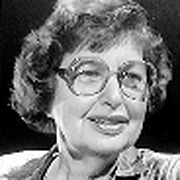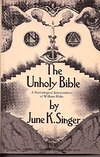June Singer (1918–2004)
Auteur de Boundaries of the Soul
A propos de l'auteur
June Singer, Ph.D., is a Jungian analyst and the author of several books
Notice de désambiguation :
(eng) Date of birth and date of death are listed as per Social Security Index on FamilySearch, dates in Wikipedia (as of March 2024) are incorrect.
Œuvres de June Singer
Modern Woman in Search of Soul: A Jungian Guide to the Visible and Invisible Worlds (Jung on the Hudson Books) (1998) 36 exemplaires
Power of Love: To Transform Our Lives and Our World (Jung on the Hudson Book Series.) (2000) 14 exemplaires
Sources of Creative Activity 1 exemplaire
June Singer-Collected Papers Vo. 1-6 1 exemplaire
Oeuvres associées
Jung and the Lost Gospels: Insights into the Dead Sea Scrolls and the Nag Hammadi Library (1989) — Avant-propos, quelques éditions — 218 exemplaires
Analytic Life: Personal and Professional Aspects of Being a Jungian Analyst (1988) — Auteur, quelques éditions — 15 exemplaires
Étiqueté
Partage des connaissances
- Nom légal
- Singer-Sunshine, June Rose
- Autres noms
- Kurlander, June Rose (birth name)
- Date de naissance
- 1918-10-23
- Date de décès
- 2004-01-29
- Sexe
- female
- Nationalité
- USA
- Lieu de naissance
- Cleveland, Ohio, USA
- Lieu du décès
- Beachwood, Ohio, USA
- Cause du décès
- spontaneous cerebral hemorrhage
- Lieux de résidence
- Cleveland, Ohio, USA
Palo Alto, California, USA
Chicago, Illinois, USA
San Francisco, California, USA
Minnesota, USA - Études
- Northwestern University (PhD|Psychology)
Ohio State University (BA|Art Education)
C. G. Jung Institute, Zurich (Jungian analyst) - Professions
- gnostic scholar
psychologist
jungian analyst
lecturer - Organisations
- C. G. Jung Institute of Chicago
Analytical Psychology Club of Chicago
Inter-Regional Society of Jungian Analysts
International Association for Analytical Psychology
Institute of Transpersonal Psychology - Notice de désambigüisation
- Date of birth and date of death are listed as per Social Security Index on FamilySearch, dates in Wikipedia (as of March 2024) are incorrect.
Membres
Critiques
Listes
Vous aimerez peut-être aussi
Auteurs associés
Statistiques
- Œuvres
- 12
- Aussi par
- 4
- Membres
- 957
- Popularité
- #26,917
- Évaluation
- 3.8
- Critiques
- 8
- ISBN
- 36
- Langues
- 3
- Favoris
- 2
















Singer's systematic breakdown of Jungian psychology is actually very concise, informative and digestible, but in total comprises, perhaps, only a third of the content; the rest of the book explores the actual practice and experience of psychotherapy, and will likely only be of interest to prospective psychoanalysts or analysands.
That being said, despite the significant lack of brevity, I finished the book feeling that I had extracted a basic but clear understanding of Jungian psychology -- and there were actually quite a few literary gems of wisdom that I collected as well. Singer was a talented writer.
My only objective criticism of the book is that Singer periodically injected her feminist, egalitarian, some would even say cultural Marxist politics into the book. In several instances, she actually criticized Jung himself for not designing a psychology that was 100% compatible with her ideological beliefs, and she writes Jung off as being "a product of his era" whenever she disagrees with certain attitudes or beliefs of Jung's that were "patriarchal".
Well, perhaps I could level the same criticism at Singer: she was as much an ideological product of her era as Jung was of his.… (plus d'informations)